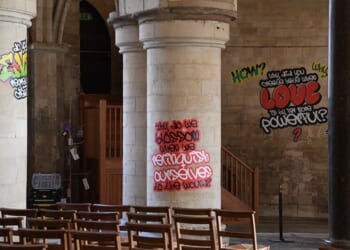RELIGIOUS EDUCATION (RE) should be moved into the national curriculum in England to “improve access to high-quality provision and to prevent further diminishment”, a review commissioned by the Government has concluded.
Changing the name of the subject should also be considered, it says.
The Curriculum and Assessment Review, chaired by Professor Becky Francis, looked at the primary, secondary, and age-16-19 stages in state education in England. More than 7000 responses to the public consultation were received, and evidence was reviewed by a panel appointed by Professor Francis. An interim report was published in March (Comment; News, 28 March). Her final report, Building a World-Class Curriculum for All, was published on Wednesday.
Over 197 pages, it assesses the standard of the current curriculum, assessment, and qualifications system, giving detailed recommendations for each subject. Generally, it concludes that the current curriculum is “not working well for all”.
RE is at present a basic curriculum subject, meaning that it is not on the national curriculum, but must be provided by schools, although parents and carers have the right to withdraw their child.
This status, the reviewers say, means that “its content is not nationally defined, and no specified national standard exists against which to benchmark the quality of compulsory RE at Key Stages 1 to 4. While there are undoubtedly pockets of excellent practice in both faith and non-faith schools, the evidence suggests that provision for RE in many schools is not good enough and does not prepare pupils adequately for life beyond school.”
A recent Ofsted report said that RE in English schools often failed to prepare students to “live in a complex world” (News, 19 April 2024).
Local-authority standing advisory councils on RE (SACREs) advise local authorities on the syllabuses, which are determined by an Agreed Syllabus Conference. “Some SACREs support high-quality regional practice, but many no longer have the resources or reach to provide such support, resulting in increasing fragmentation,” the reviewers explain.
This is further exacerbated by the “complex legislative framework underpinning RE, which hasn’t changed in substance since 1944, apart from some minor updates in 1988”. Unlike curriculum subjects, the quality of RE is not necessarily determined by the type of school, the reviewers say, and “we have heard that this static statutory backdrop, with complex and fraying local support arrangements, has led to uneven provision and tokenistic practice in some areas.”
Recognising that “RE can be controversial and contentious,” the reviewers had sought to hear from as many differing beliefs and interests as possible.
“We are of the view that RE’s importance is not currently reflected in its standing in the curriculum. The Review believes that RE should be moved to the national curriculum to improve access to high-quality provision and to prevent further diminishment.”
Deborah Weston, who chairs the Religious Education Policy Unit, described the proposal as “the most important opportunity for the subject in decades. After years of neglect, RE is adrift. Across the country, hundreds of thousands of students do not receive an academic, specialist study of the different religious and non-religious worldviews that make up modern Britain. This is now an opportunity to end that.”
The reviewers also, however, acknowledge the “sensitivities and complexities involved” in this reform, and that “it is unrealistic for this to be achieved immediately.”
They therefore recommend a “staged approach”, in which “the Government invites the sector to establish an independent task and finish group made up of representatives from faith bodies, secular groups, and experts from the teaching and wider education sector, to develop a draft RE curriculum.”
This should build on the National Content Standard set by the Religious Education Council (REC) in 2023, which is praised by the reviewers. “The [task and finish] group should also consider whether there would be benefit in changing the name of Religious Education,” their report says.
It also recommends that the Department for Education’s non-statutory guidance for RE (which has not been updated since it was published in 2010) and the wider framework, including SACREs, should be reviewed, and attention given to the subject content of the optional GCSE in Religious Studies.
Finally, it recommends that the current statutory requirement to teach RE between the ages of 16 and 18 — which applies to school sixth-forms only — be removed, though schools and pupils could choose to continue. “The Review considers that, by age 16, students should have a secure grounding in RE, and one that should be strengthened if the recommendation about the national curriculum is taken forward.”
The proposals were welcomed by the REC. Its chair, Sarah Lane Cawte, said: “This marks the start of a new era” for RE which would require “collaboration across the subject’s community to help deliver the vision of the new National Curriculum. . . We are confident that together we can deliver a subject that is intellectually rigorous, challenging and geared towards helping young people flourish in modern Britain.”
The chair of the National Association of Teachers of RE, Katie Freeman, said: “Alongside accountability measures and the restoration of the teacher training bursary, we have an opportunity to end the ‘postcode lottery’ of teaching in RE and ensure every student in the country gets the best of our subject.”
Among the other recommendations of the review are the abolition of the English Baccalaureate (EBacc). “It is clear that [its] performance measures have to some degree unnecessarily constrained students’ choices,” it says. “This has affected their engagement and achievement, and limited their access to, and the time available for, arts and vocational subjects.”
The Church of England’s Chief Education Officer, the Revd Nigel Genders, welcomed the decision. The EBacc was, he said, “an accountability measure which has always had a negative impact on RE”. The change would make it “easier for pupils to study Religious Education at GCSE as part of a broad and balanced curriculum”.
The Church’s National Society for Education had contributed to the review, and would, he said, continue to engage with proposals “to develop RE in a way that ensures every young person has the opportunity to explore questions of meaning, purpose and belief, whilst enabling church schools to continue to provide RE in a way that is consistent with their designation as schools with a religious character.”
Other key recommendations set out in the review include shortening GCSE exams by ten per cent (a reduction of about three hours per pupil); ensuring diversity in the national curriculum; developing diagnostic Maths and English tests for Year 8 pupils so that teachers can identify and resolve problems before students progress to Key Stage 4; statutory citizenship classes; a review of how grammar is taught and tested in primary school; replacing the computing science GCSE with a broader subject which applies digital technology and data more widely, including through AI; and allowing students to take biology, physics, and chemistry courses at GCSE — “triple science” — rather than double science.

















